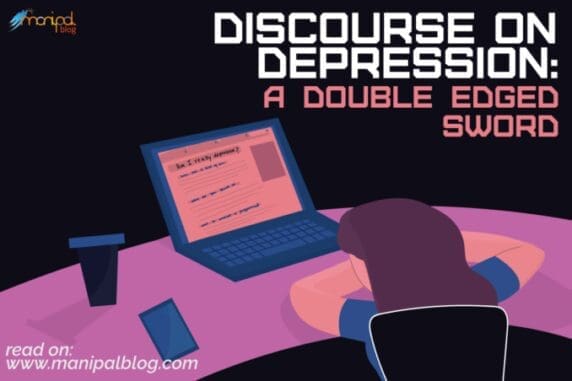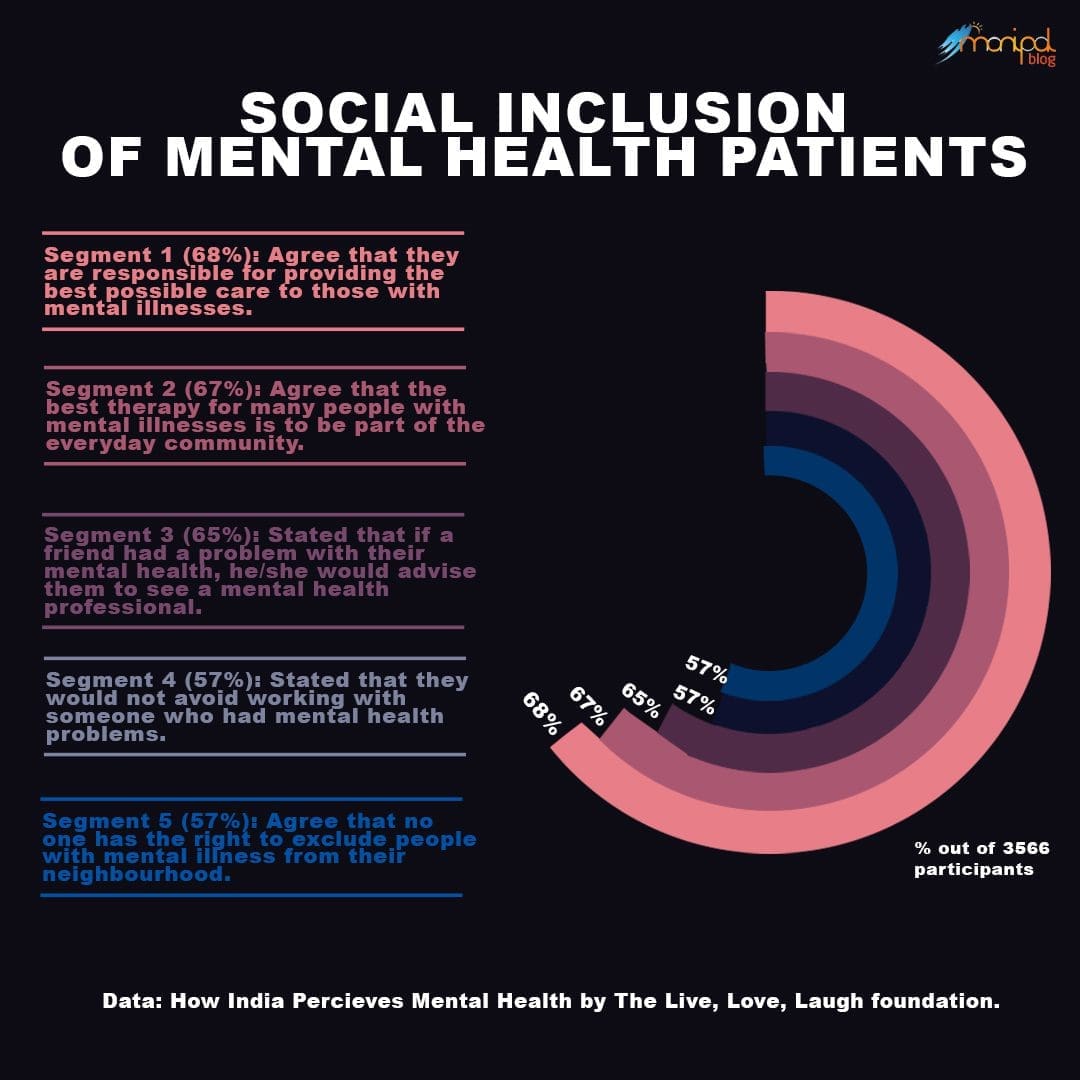
TRIGGER WARNING: This Discourse on Depression mentions and discusses depression, self-harm, and suicide.
India is no stranger to the concept of depression. With movies like Hasee Toh Phasee and Anjaana Anjaani earning millions at the box office to the deaths of beloved celebrities provoking social outrage within the population, it is no longer something that is spoken about in hushed whispers behind closed doors.

Categorized under mood disorders, depression, or as the professionals call it, Major Depressive Disorder is accompanied by other depressive disorders like dysthymia, disruptive mood regulation disorder, and bipolar disorder.
The DSM-5 (Diagnostic and Statistical Manual of Mental Disorders) describes it as
“an extremely depressed mood state that lasts at least two weeks and includes cognitive symptoms (such as feelings of worthlessness, and indecisiveness), and disturbed physical functions (such as altered sleeping patterns, significant changes in appetite and weight, or a notable loss of energy) to the point that even the slightest activity or movement requires an overwhelming effort. The episode is typically accompanied with a general loss of interest in things and an inability to experience any pleasure from life, including interactions with family or friends, or accomplishments at work or school.”
The Online Discourse on Depression
The advent of science and technology has enabled professionals in the field and mental health advocates to clear misconceptions that it is not just “having the blues” or “experiencing a bad day.” As a result, society has been progressing towards understanding the nuances of mental health. Bollywood movies like Dear Zindagi and Chicchore have generated positive conversations about mental health disorders, where people are encouraged to be more cautious while using terms like “depressed,” “mental,” and “retard” in everyday conversations.
Between users on twitter making threads describing their experience with depression, and celebrities like Deepika Padukone sharing posts that name organizations and resources for people suffering from depression, discourse is happening, and awareness is spreading. Unfortunately, this discourse has its problems.
A growing part of the discussion is inaccurate and misinformed. There has been a severe prettification of depression on popular social media platforms like Facebook, Tumblr, and
Instagram. Teenagers often share their experiences with mental health conditions like depression and encourage others to do the same on these platforms.
A quick search under hashtags like #depression, #imnotokay, #alwaysalone, #alwayssad, and #hurtinginside reveal posts that shared monotone pictures of girls who appear to be sad and crying, people smoking cigarettes, showing self-harm scars, and aesthetic images with quotes like “I deserve to die,” “you don’t need anyone,” “I feel like I’m drowning in my sorrows.” The captions under these posts ask users to like and share, to repost, and follow for more.
The Rise of the Memes
Alongside this, there has been an upsurge of “memeification” of mental health disorders. While it is widely known that humor is identified as a coping mechanism, with certain posts, the line between healthy and unhealthy coping mechanisms is blurred. For instance, tweets where a user describes a particular behavior and ends it with the question “or are u normal?” began trending on twitter.
Listed below are few of these types of tweets:
do u listen to people every single day instead of going to a therapist or are you normal
— laura loves 슙국⁷ (@lightsynkk) August 1, 2020
Y’all ever must ghost your therapist for a couple weeks or are u normal
— throat goat (@emhoetional_) August 8, 2020
is the notes app on your phone your therapist or are u normal
— macy spencer (@macyspncer) August 6, 2020
It cannot be denied that relating to a tweet in this format provides users with a sense of exclusivity and validation. Under the guise of “Gen Z culture,” teenagers online are often comparing and glorifying how little sleep they get, how little they eat in a day, and how unhealthy they are.
While twitter has a chaotic balance of tweets like these and threads that highlight the importance of seeking help and recovery, it is the former tweet format that makes its way onto websites like Instagram and Pinterest in the form of screenshots. Tweets that talk about how depression is nothing to be joked about, and encouraging users to get help and become healthy receive almost zero interactions in comparison to the memes.
One could argue that these posts are depressed individuals merely sharing their experiences and drawing comfort and support from their online community. However, content and discussions of this kind become problematic when they mention no trigger warnings and absolutely no words encouraging users to seek help from professionals and work on bettering themselves.
Due to the massive popularity of posts like these, there has been a commodification of depression. T-shirts that read “No lives matter,” “Need to Diequick,” “Clinically Depressed” are sold on multiple clothing and merchandise websites. Another merchandise website sells shiny gold necklaces that read “Depression” and “Anxiety.” A quick google search for “depression merchandise” throws up more than 47,00,000 results and a never-ending number of pages.
A beautiful and easy to consume image of depression has formed on the internet over the years. Not only is it imprecise, but it also alienates those who are suffering from severe depression.
Offline Vs. Online: Is Depression The Same?
In an attempt to normalize depression, encourage conversation, and spread awareness, we accidentally created an atmosphere that still leaves sufferers of depression facing the same difficulties as they did when it was stigmatized. There is an apparent distinction between depression online and depression offline.
Depression offline is ugly, unbearable, and hindering. Results from a national survey (with over 3,000 participants) on how India perceives mental health revealed the following:
- 68% believe that people with mental illnesses should not be given any responsibility.
- 46% felt that one should keep a safe distance from someone who is depressed, and
- 41% agreed that sitting with/talking to a mentally deteriorated person could lead to deterioration of the mental health of a healthy person.

Depression offline is where there is a strong stigma toward people with mental illnesses. It is in this horrifying reality that one can be isolated, fired, and discriminated against for having depression. This stark discrepancy between online platforms and reality is ultimately harmful and could set the agenda of spreading accurate and reliable information about depression two steps back.
Compared to where society was just two decades ago in terms of mental health awareness and acceptance, it cannot be denied that there have been massive strides towards progression. However, with how depression has been glorified and glamorized in an attempt to normalize it, it becomes crucial to boost discussions that refer to seeking help, positive mental health, and recovery. Ultimately, the goal is not for everyone to be depressed and aware of it but also to be open to taking measures to combat it.
Do Seek Help!
If you think that you might be experiencing depression or any other mental health condition, please contact a mental health professional immediately.
Here are some helplines and centers in Manipal:
- The Student Support Centre (SSC) can be contacted through email ([email protected]) and phone (0820-2922430). They currently offer online therapy and counseling. SSC’s website (https://ssc.manipal.edu) also provides insights on issues that one might be facing and how to proceed with seeking help.
- KMC Emergency: 0820-2922761, 0820-2922246, 0820-2923154, 0820-2922352, 0820-2922721
- KMC Ambulance: 0820-2922761
- Anti-Ragging: 1800 425 6090
- Aasra is a national 24×7 suicide helpline and is available on 91-22-27546669
About the Author – Quirky and with a wicked sense of Humour, Nayana does it all. Her sense of responsibility is second only to her abilities in gfx and writing. Nayana is a second year student at Manipal Institute of Communication where she is honing her content creation skills and pursuing a degree in media.
Featured image and graphics by Nayana Dhanya.


This was very insightful! Brilliant read! Hope to see more from the author!.
This was a very informative article for a very sensitive subject. The tone is very friendly and I believe it’s very approachable for the young audience. Thank you for your hard work. I will expecting more❤️
This was a very well written piece! Loved the graphics too! but yes, such a sad thing that depression is being glorified/romanticised or something like they used to do with war.. is there really being merch selled?? Just want to knock some heads together by just reading that.
Nonetheless, all the best to the author and hopefully will see more of her work! https://media0.giphy.com/media/AGOPaltgJ2pBC/giphy.gif